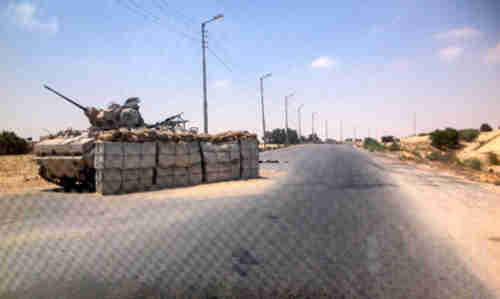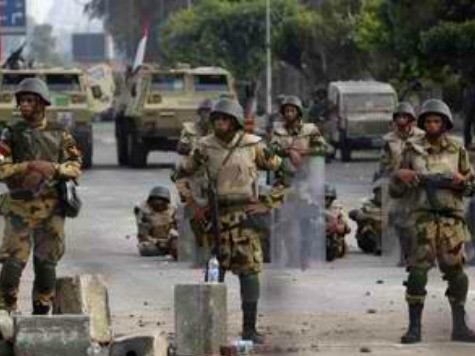
This morning’s key headlines from GenerationalDynamics.com
- Suicide bombers target Egypt’s police after massive street riots on Sunday
- Turkey builds a wall along the border with Syria
- Russia’s divine sense of exceptionalism
Suicide bombers target Egypt’s police after massive street riots on Sunday

Army checkpoint in Sinai in mid-July (Reuters)
Ever since Egypt’s president Mohamed Morsi was deposed in an army coupon July 3, the Egyptian people have hoped that the level of violencewould settle down, but that doesn’t appear to be happening. Gunmenand suicide bombers made multiple attacks on Egypt’s security forceson Monday, including a gun attack that killed six soldiers inIsmailia, a Suez Canal city, and a bombing at security headquarters insouthern Sinai kill four people, on the other side of the Suez Canal.It comes after clashes on Sunday between security forces and armedcivilians, mostly Morsi supporters, resulted in the killing of 51people. Al-Jazeera and AFP
Turkey builds a wall along the border with Syria
Turkey has criticized Greece closing the border with Turkey, forcing thousands of would-be immigrantswanting in Turkey wanting to enter Greece to risk being smuggledacross the Aegean Sea. And America’s fence on the border with Mexicohas been mired in controversy. So it’s of interest that Turkey isbuilding a two-meter high wall topped with barbed wire fencing alongits border with Syria. The wall is expected to span just a fractionof Turkey’s 560 mile border with Syria, but after 500,000 Syrianrefugees have already crossed over into Turkey since the start of theSyrian civil war, Turkey feels the need to do something. However,Turkey says that it will maintain its “open door” policy to thosefleeing the fighting in Syria.Hurriyet (Ankara) and Reuters
Russia’s divine sense of exceptionalism
Last month, the NY Times published an op-ed written by Russia’spresident Vladimir Putin in which he criticized the concept ofin fact, it’s Russia that has a sense of not just exceptionalism, butexceptionalism derived from God. Recently, President Obama said thatAmerica was exceptional because it is not indifferent to humansuffering. But that’s quite different from Russia’s glorification ofthe quasi-divine status of the Russian state. It’s holding this viewthat let’s him do things like invade Georgia, as he did in 2008, andannex two of Georgia’s provinces.
Russia’s sense of exceptionalism arose after the fall ofConstantinople to the Muslim Ottomans in 1453. Constantinople(today’s Istanbul) had been the Greek Orthodox Christian successor toRome after the fall of the Roman Empire. When Constantinople fell,leaders of Russia took on the burden of leading the Christian world asthe “third Rome.” (In fact, the world “Czar” or “Tsar” is derivedfrom the word “Caesar.”) Russia took on the role of the defender ofJerusalem almost fanatically, and that was a prime motivation forRussia’s disastrous involvement in the Crimean War, its generationalcrisis war in the 1850s.
Its next crisis war, the Bolshevik Revolution of 1917, there was aharsh adverse reaction to the Crimean War, and not only was theTsarist state destroyed, but the Russian Orthodox Church itself wasalmost destroyed, as Russia became an “atheist” Communist country.The Church began to revive in the 1940s with World War II, which wasan Awakening era war for the Russians, albeit a particularly brutalone. Since the 1990s, Russian leaders, led by Putin, have sought torevive the special role of the Russian Orthodox Church, allowing thecombination of Russia and the Church to return to the state ofworld. Foreign Policy Research Institute
Permanent web link to this article
Receive daily World View columns by e-mail

COMMENTS
Please let us know if you're having issues with commenting.